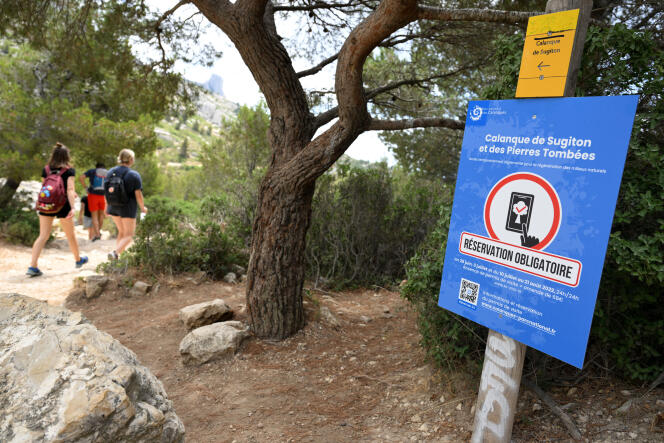
In the summer of 2022, mandatory reservations were set up at the Calanques National Park (PNC) in southern France's Marseille in order to limit the number of visitors coming to the calanque de Sugiton and the calanque des Pierres Tombées. The system should "undeniably be considered a success," according to the managers of the park. "Practical action to regulate the number of visitors in an environmentally sensitive area is possible," a report said.
Such was its success that the administrators of France's only peri-urban national park, located only a few kilometers from the center of Marseille, unanimously decided to continue the experiment in the same area until the summer of 2027, and extend it, starting summer 2023, to the entire tourist season and more: From late June to early September. This extension will allow a more precise evaluation of the measure's environmental effects by scientists.
Confronted with the overcrowding of these two exceptional sites, close to and easily accessible from Marseille, the public institution makes it mandatory for the public to make a reservation on the Internet before arriving to cap visitors' numbers. "According to the PNC, this is the ultimate management lever for maintaining the perilous balance between welcoming an ever-increasing number of visitors and preserving the environments for which it is responsible."
Absence of tension at access points
A capacity of 400 people per day was set for this 9.5-hectare area where more than 2,500 visitors used to be able to go during the summer. The experiment began punctually at the end of June but only became daily from July 10 to August 21, when the summer season was in full swing.
Several lessons can be drawn from the summer 22 test period. The visit permit did not diminish the appeal of the calanque de Sugiton. The available slots were taken by storm within three hours of the opening of reservations online, three days beforehand; yet, surprisingly, the actual average attendance of the natural site remained well below the gauge, between 200 and 250 visitors per day.
"On a daily basis, more than 100 people who had booked did not show up at the restricted area's access points," said the Calanques National Park. A dozen people had, moreover, been turned away each day for not having a reservation – a marginal figure according to the PNC, which has seen how effective its communication and information signs at the park have been.
Another positive aspect of the report was the absence of tension at access points. "Attempts to break in were particularly rare," according to the PNC, whose teams had not hidden their fears that the system would generate uproar and misunderstandings with some visitors before the summer. In the end, only two fines were issued by the environmental inspectors during the entire period under control for "voluntary circumvention of the system." "Peace of mind was felt well beyond the strictly regulated zone," the results of the experiment noted with satisfaction.
Protecting the natural environment
The main purpose of controlling visitors' access to the calanque de Sugiton was to protect a cove that the national park has defined as "the most sensitive, vulnerable, and degraded" site on its territory. In this respect, the results have been promising but still remain insufficient. With human presence divided cut significantly, it put "an immediate stop to what was, until then, a continuous degradation to its habitats." By providing free space on the seaside areas, namely beaches and rocks, the mandatory reservation has prevented bathers from laying their towels down in protected areas.
"Although the chosen period allowed the extreme peaks to be capped, the entire period of high attendance, from early May to mid-September was far from covered," said the PNC teams. As soon as the quota was lifted, the number of visitors to the cove immediately increased, with peaks of 1,000 people per day during the weekends of late August and early September. This observation explains the administration's decision to extend the quota period to the entire months of July and August starting in summer 2023. The PNC has yet to announce which days in the months of June and September will be added to the quota period.
While the experiment has been strengthened and extended to the calanque de Sugiton, its extension to other national park sites is not yet on the agenda for now. "Sugiton is the only one that today presents real issues of erosion of the natural environment," said the park.